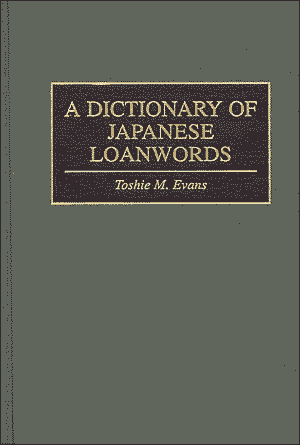昨日,「いのほたチャンネル」(旧「井上逸兵・堀田隆一英語学言語学チャンネル」)の最新動画が公開されました.「最初の日本語由来の英語は?いまや hikikomori や enjo kosai も!---外来語の諸相-「ナイター」「柿」【井上逸兵・堀田隆一英語学言語学チャンネル 第209回】」です.英語に入った日本語単語の歴史を概説しています.馴染み深い日本語が多く出てくるので,入りやすい話題かと思いますが,れっきとした英語史の話題です.
動画内では典拠として OED のほか,A Dictionary of Japanese Loanwords というおもしろい辞書を用いており,紹介もしています.この辞書については,最近の hellog でも「#5410. A Dictionary of Japanese Loanwords --- 英語に入った日本語単語の辞書」 ([2024-02-18-1]) にて取り上げていますので,そちらもご一読ください.

同辞書の冒頭の説明書きを読んでみましょう (ix--x) .
A Dictionary of Japanese Loanwords is a lexical index of terms borrowed from the Japanese language that are listed in standard English dictionaries and in publications that analyze new words. Therefore, this dictionary covers both the loanwords that have withstood the test of time and those whose test has just started.
American standard dictionaries keep records of borrowings from the Japanese language; most of them, however, do not furnish quotations. A Dictionary of Japanese Loanwords adds a special contribution by providing illustrative quotations from many entries. These quotations were collected from books, newspapers, magazines, advertisements, and databases, all of which were published or distributed in the United States between 1964 and 1995. They give details about the entry, demonstrate how it is used in a natural context, and indicate the degree of its assimilation into American English.
Recent studies report that Japanese is the second most productive source of new loanwords to English, which indicates that the English-speaking world is paying attention to Japan more closely than ever before. The entries and illustrative quotations present the aspects of Japan that Americans have been exposed to and have adopted. Karaoke, for example, first appeared in English in 1979, when English-speaking societies observed and read about a karaoke fever in Japan. Today, Americans find themselves enjoying karaoke. Karaoke showcase, a weekly television talent contest, appeared on 120 U.S. stations in June 1992. A phenomenon like this is shown in this book in the form of lexical entries.
The impact that Japan has made on America covers all aspects of life: aesthetics, architecture, arts and crafts, astronomy, biology, botany, business management, clothing, economics, education, electronics, fine art, food and food technology, medicine, oceanography, pathology, philosophy, physics, politics, religion, sports, technology, trade, weaponry, zoology, and so on. Some entries are not accompanied by a quotation; nevertheless, when dictionaries record words they indicate that these words are somehow linked to people's everyday lives. A Dictionary of Japanese Loanwords is also meant to be fun to read. I hope that it will provide the meaning for Japanese words the reader has come across on many occasions, and that it will be an occasion for happy browsing.
この辞書の魅力は,何よりも引用文が豊富なところ.まさに "happy browsing" に最適な「読める辞書」です.
・ Toshie M. Evans, ed. A Dictionary of Japanese Loanwords. Westport, Conn.: Greenwood, 1997.